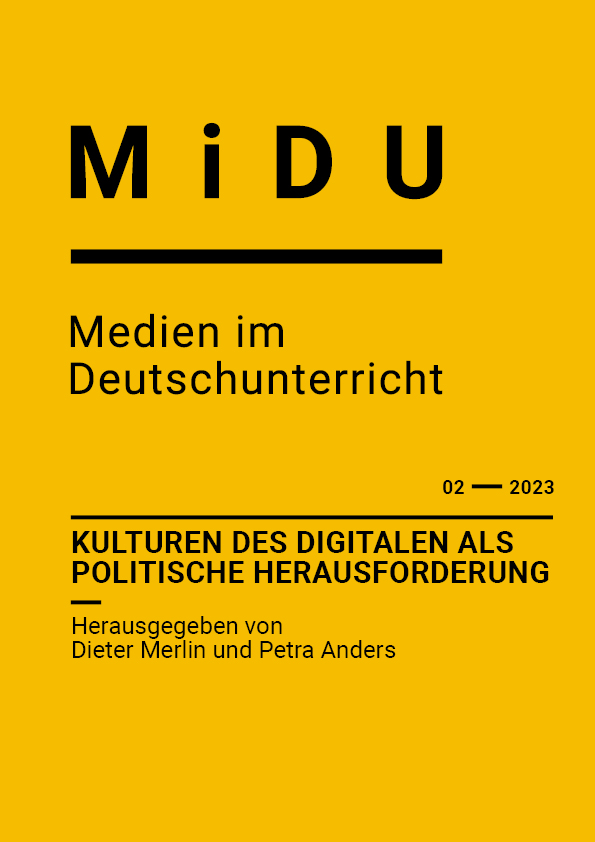Von Fake News bis ChatGPT. Digitale Textsouveränität als ethisch-politische Bildungsaufgabe für Deutschdidaktik und Deutschunterricht in der digitalen Welt
DOI:
https://doi.org/10.18716/OJS/MIDU/2023.2.4Schlagwörter:
digitale Souveränität, digitale Textsouveränität, digitales Influencing, Fake News, ChatGPT, KIAbstract
Die digitale Transformation verändert Schule und Hochschule ebenso umfassend wie tiefgreifend. Der Deutschdidaktik und dem Deutschunterricht kommt dabei eine besondere Bedeutung zu, weil die digitale Transformation vor allem in Form multi-modaler bzw. symmedialer digitaler Texte in Erscheinung tritt (Frederking / Krommer 2019; 2022).¹Damit sind spezifische ethische und politische Implikationen verbun-den. Denn Hate Speech, Cybermobbing, digitale Desinformation, digitales Influen-cing und digitale Fake News (Frederking 2022a; 2023; UNESCO 2022) sind sprach-basierte Phänomene. Gleiches gilt für die auf generativer KI basierenden Chatbots wie ChatGPT. Auch sie verändern digitale Textualität und fachspezifische ethische und politische Bildung in der digitalen Welt signifikant. Dass die Theorie der digitalen Textsouveränität (Frederking 2022a; 2023) Ansatzpunkte bietet, diesen neuen fach-spezifischen Herausforderungen zu begegnen, soll nachfolgend verdeutlicht werden. Zunächst wird die Theorie akzentuiert zur Darstellung gebracht und in ihren ethisch-politischen Implikationen veranschaulicht (1). Praktische Anwendungsmöglichkei-ten rücken anschließend am Beispiel von Fake News und ChatGPT in den Fokus (2).
Abstract (english): From Fake News to ChatGPT. Digital Text Sovereignty as an Ethical-Political Educational
Task for German Didactics and Teaching in the Digital World
The digital transformation is changing schools and universities both comprehensi-vely and profoundly. German didactics and teaching are of particular importance in this context, because the digital transformation appears primarily in the form of multimodal or symmedial digital texts (Frederking / Krommer 2019; 2022). Specific ethical and political implications are associated with this. After all, hate speech, cy-berbullying, digital disinformation, digital influencing, and digital fake news (Freder-king 2022a; 2023) are language-based phenomena. The same is true for generative AI-based chatbots such as ChatGPT. They, too, significantly change digital textuality and subject-specific ethical and political education in the digital world. That the theo-ry of digital textual sovereignty (Frederking 2022a; 2023) offers starting points to meet these new subject-specific challenges will be clarified below. First, the theory will be presented in an accentuated way and its ethical-political implications will be illustrated (1). Practical applications will then be focused on the example of Fake News and ChatGPT (2).
Downloads
Veröffentlicht
Versionen
- 10.06.2024 (2)
- 24.11.2023 (1)
Ausgabe
Rubrik
Lizenz
Copyright (c) 2023 Volker Frederking

Dieses Werk steht unter der Lizenz Creative Commons Namensnennung - Keine Bearbeitungen 4.0 International.







